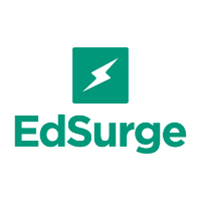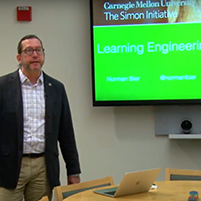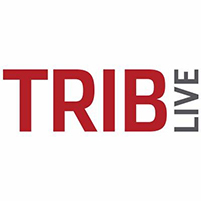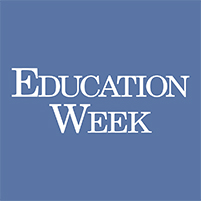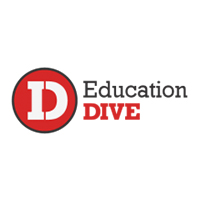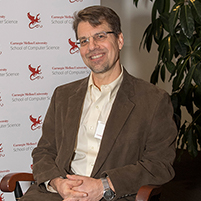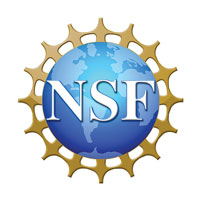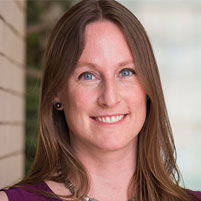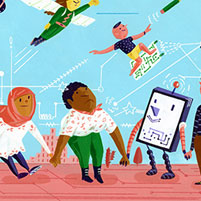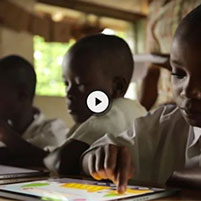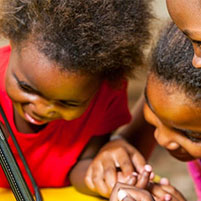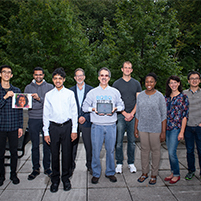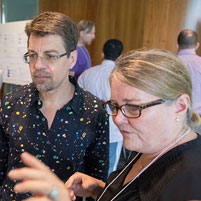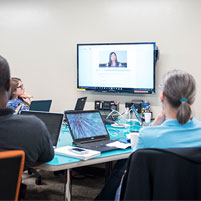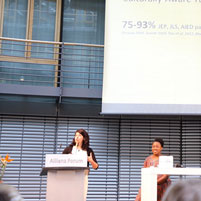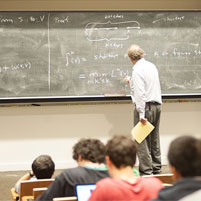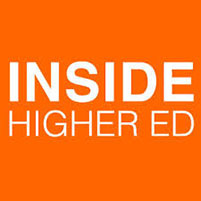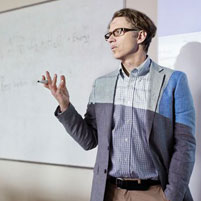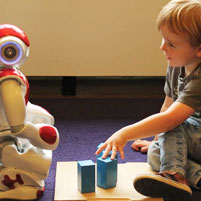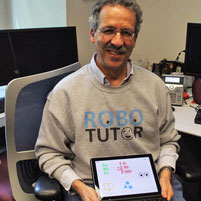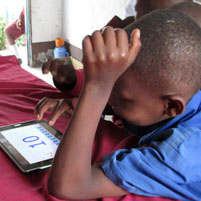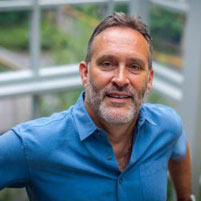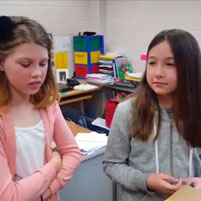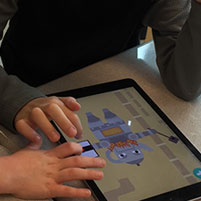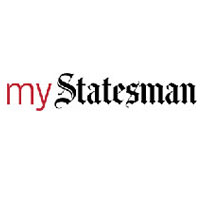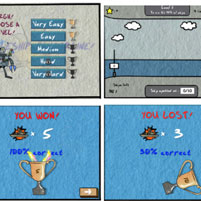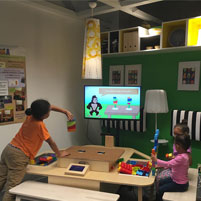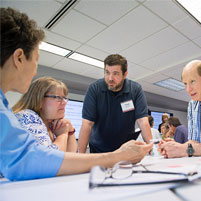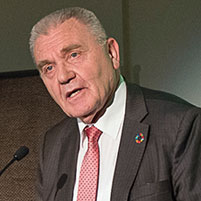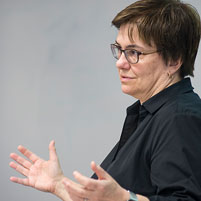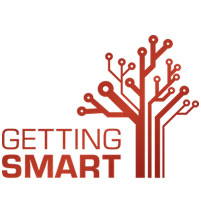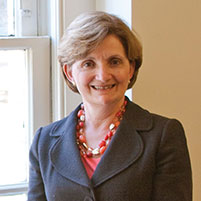Simon News, 2017
December 20, 2017
The Possibilities for Tech (and Screentime) in the Preschool Classroom
EdSurge
Whether digital games provide children the potential for full-body play or for prompting communication and conversation, there are a variety of ways that technology can enhance the learning environment in the classroom, particularly with younger children.
December 19, 2017
Carnegie Mellon University
A discussion at the 2017 EDUCAUSE Annual Conference focused on learning engineering as an emerging discipline built upon data science, learning analytics and design based research, to better understand how students learn and instructional strategies that enable optimal learning. Carnegie Mellon University’s Norman Bier argues that learning engineering itself is not a new concept, but one that’s been developing since Herbert Simon coined the approach and phrase 50 years ago.
December 18, 2017
Which Pittsburgh tech companies advanced in XPRIZE competitions?
NEXT Pittsburgh
Tech companies from all over Pittsburgh have made quite an impression on XPRIZE, a leader in seeking innovative solutions to the world’s greatest challenges. RoboTutor, a Carnegie Mellon Universtiy spin-off company that designs educational apps, became a finalist in the $15 million Global Learning XPRIZE.
December 14, 2017
Pittsburgh dominating global artificial intelligence competition
TRIB LIVE
RoboTutor, a Carnegie Mellon University spin-off company developing an app that uses facial analysis and machine learning to help teach math and reading, is one of five finalists in the $15 million Global Learning XPRIZE.
December 12, 2017
CMU: Pittsburgh's Learning Engine
Education Weekly
Fifty years ago Carnegie Tech and the Mellon Institute merged to form Carnegie Mellon University (CMU). Since then, the university has been a powerhouse in AI and tech startups, such as RobotTutor, as well as a leader in learning sciences, such as LearnLab.
December 11, 2017
Framing 'Failure' As a Necessary Educational Experience
EducationDIVE
Robert Siegler, the Teresa Heinz Professor of Cognitive Psychology at Carnegie Mellon University, said that failure helps individuals better understand their strengths and passions, but noted that in K-12 education, education pursuits are often deemed to be obligatory, “regardless of the individual’s interests, capabilities, successes and failures.”
December 8, 2017
Koedinger Assumes Hillman Professorship
Dietrich College of Humanities and Social Sciences
Ken Koedinger, professor in the Human-Computer Interaction Institute and Department of Psychology, accepted the Hillman Professorship of Computer Science in a ceremony Dec. 6 in the Gates and Hillman centers.
November 20, 2017
Anna Fisher Receives NSF Science of Learning Grant
Dietrich College of Humanities and Social Sciences
Fisher, associate professor of psychology, will work to understand whether design of reading materials for beginning readers can be optimized taking into account children’s developing attention regulation skills.
November 14, 2017
Do Professors Need Automated Help Grading Online Comments?
Inside Higher Ed
Carolyn Penstein Rosé, a professor at the Language Technologies Institute and the Human-Computer Interaction Institute at Carnegie Mellon University, said that she also had some reservations about Blackboard’s proposed feature.
November 9, 2017
Why Faculty Members Still Aren’t Sure What to Make of Education Technology
Chronicle of Higher Education
Lauren Herckis' work is featured.
October 26, 2017
OEB
Plenary Keynote Lauren Herckis, an anthropologist specialising in faculty culture and the use of technology at Carnegie Mellon University, USA, shared insights and advice from her research.
October 20, 2017
RoboTutor Aims to Help 250 Million Children in Developing Countries
Next Generation Learning Challenges
The RoboTutor software is powered by advanced technologies, including speech and handwriting recognition as well as facial analysis and machine learning to enable cognitive tutors powered by artificial intelligence to adapt to individual students.
October 4, 2017
Want Change In Education? Look Beyond The Usual Suspects (Like Finland)
NPR
In a tiny hamlet in Tanzania, children who have never been to school, and can't recognize a single letter in any language, are about to start learning basic math and reading. They'll do this with the help of a cutting-edge, artificially intelligent "tutor" who can hear what they are saying in Swahili and respond meaningfully.
September 27, 2017
App Makers Aim to Prove World’s Poorest Children Can Educate Themselves
Voice of America
Can children who have never been to school teach themselves basic reading, writing and math skills using only a tablet computer? Elon Musk and XPRIZE are betting $15 million on the idea.
September 26, 2017
How 'Intelligent' Tutors Could Transform Teaching
Education Week
Schools may be critiqued as "factories," but robots aren't going to replace human teachers any time soon. Still, that doesn't mean that artificially intelligent systems won't transform education just as they are changing a variety of fields and practices, from the way oncologists diagnose cancer to how lawyers analyze cases.
September 18, 2017
Here Are the 5 Finalists for the $15M XPRIZE Global Learning Challenge
Ed Surge
Today, at the Social Good Summit that accompanies the United Nation’s annual General Assembly in New York, XPRIZE unveiled the five finalists.
September 18, 2017
RoboTutor Team Led By Carnegie Mellon’s Mostow Wins $1 Million as Global Learning XPRIZE Finalist
The Simon Initiative
Led by CMU’s Jack Mostow, RoboTutor is educational technology that incorporates cognitive tutors pioneered by Dietrich College researchers. The goal is to increase basic literacy and numeracy for children, and it will now be field-tested in Africa.
September 13, 2017
Carnegie Learning Bets Big on Coding With Acquisition of Globaloria
EdSurge
Both companies trace their lineage to top-pedigree universities: Carnegie grew out of research on computer-based instructional systems started by Carnegie Mellon researchers.
September 13, 2017
How to Give All Students Moonshot Thinking Skills
Huffington Post
NoRILLA is part of CMU Learn Lab, an on-campus research center in partnership with Carnegie Mellon University, and is a mixed-reality educational system that bridges physical and virtual education to improve children's science learning.
September 12, 2017
New Educational Technology Projects Receive CMU ProSEED Funding
The Simon Initiative
Part of the university’s Simon Initiative, the projects will leverage CMU’s learning engineering ecosystem and integrate learning research with data-driven, innovative educational practices.
August 29, 2017
The Simon Initiative
LearnLab Director Ken Koedinger noticed his lab's summer school was different from years past. Interests spiked in creating online courses and interpreting the data collected by digital tools to provide evidence that students are learning.
August 14, 2017
Simon Summer Institute Helps Pittsburgh-area Professors Build Ed Tech Tools for Their Classrooms
The Simon Initiative
For the second year in a row, the Pittsburgh Council on Higher Education (PCHE) teamed up with the Simon Initiative to host the PCHE Simon Summer Institute. The voluntary weeklong session was designed to help faculty members from eight colleges and universities understand and incorporate Simon Initiative technologies and methods.
July 21, 2017
Making Education Technology Work for Everyone
The Simon Initiative
Educators often talk of an "opportunity gap"— academic achievement differences between students who come from privileged backgrounds and those who are less fortunate. CMU’s Amy Ogan sees this gap as both a challenge for technology and an opportunity to do better. Ogan and other Simon Initiative members presented on this and other issues around around technology enhanced learning (TEL) at the 2017 Global Learning Council Summit.
July 18, 2017
e-Literate
A recent "recommended reading" post pointed to a piece from Inside Higher Ed and The Times Higher Ed called “Fear of Looking Stupid” about research from Carnegie Mellon University anthropologist Lauren Herckis about faculty resistance to innovative approaches. Here is a guest post from Herckis and her colleagues Richard Scheines and Joel Smith with some additional perspective and follow-up information.
July 18, 2017
CMU Launches $20M Classroom and Learning Spaces Renovation Project
Carnegie Mellon University
The initiative follows a detailed assessment of nearly 100 classrooms by faculty and staff on the Learning Spaces Committee, which was established in 2016 by then-Provost Farnam Jahanian, and co-chaired by Marsha Lovett, director of the Eberly Center for Teaching Excellence and Educational Innovation, and Keith Webster, dean of University Libraries.
July 13, 2017
Carnegie Mellon Professor: Better Tech Enables Higher-Quality Online Courses
Education Dive
Bob Monroe discusses how the largely-held perception that Massive Open Online Classes would replace the traditional college lecture was largely overblown.
July 13, 2017
Innovation and the Fear of Trying
Inside Higher Education
In the campus conversations about innovation and instruction, it's the fear of trying, and the accompanying absence of institutional support and recognition, that impedes faculty efforts at innovation.
July 12, 2017
Failure To Embrace New Teaching Techniques Not Just About Fear of Embarrassment
Times Higher Education
There are many reasons why academics shun new pedagogical styles, say Lauren Herckis, Richard Scheines and Joel Smith.
July 4, 2017
Academics ‘Fail To Change Teaching Due to Fear of Looking Stupid’
Times Higher Education
Anthropologist spent more than a year among lecturers to understand why they don’t adopt innovative methods.
June 30, 2017
Robots and Related Tech Play a Role in Advancing Curricula
Ed Tech
Not every classroom application of AI and robotics involves machines or programs acting as instructors. Some efforts aim to advance educational goals by allowing students to build or run their own robots. Robin Shoop, director of Carnegie Mellon University’s Robotics Academy, advocates using robotics to advance computer science, science, technology, engineering and mathematics (CS-STEM) education.
June 26, 2017
XPRIZE Semifinalist App Could Help Kids In Developing Countries Teach Themselves
WESA-FM
The goal is to enable children in developing countries to teach themselves basic reading, writing and arithmetic in about a year. Semi-finalists for the $10 million prize were announced last week, including a CMU project called Robo Tutor..
June 21, 2017
Carnegie Mellon’s RoboTutor Advances to Global Learning XPRIZE Semifinals
The Simon Initiative
XPRIZE is attempting to address the acute shortage of teachers in developing countries by funding an international competition to create open-source Android tablet apps that enable children ages 7-10 to learn basic reading, writing and math skills without requiring adult assistance. Apps were created in both English and Swahili.
Nearly 200 teams from 40 different countries entered the competition. Following an evaluation and pilot test, RoboTutor, led by CMU’s Jack Mostow, is one of 11 remaining teams competing for five $1 million finalist prizes.
June 19, 2017
McLaren Receives NSF Grant to Data Mine Learning from Erroneous Examples
Human-Computer Interaction Institute
Erroneous examples, step-by-step examples of incorrect problem solving, is a pedagogical approach used in only a few fields, such as medical education.
June 14, 2017
Poor Students Face Digital Divide in How Teachers Learn to Use Tech
Education Week
America's most innovative schools constantly help train teachers to use new technologies, but the barriers to creating such a culture in high-poverty schools can seem insurmountable. How CMU's School of Computer Science is helping.
June 5, 2017
How to Prepare the Next Generation for Jobs in the AI Economy
Harvard Business Review
CMU School of Computer Science experts say to update the way programming is taught.
May 23, 2017
The Role Culture Plays in MOOC Success
The Horizons Tracker
The research forms part of Carnegie Mellon’s Simon Initiative, which aims to improve learning outcomes by improving the science behind education. Their approach utilizes the interactive method of learning pioneered by the university’s Open Learning Initiative (OLI).
May 22, 2017
Makers Movement Changes the Educational Landscape
U.S. News and World Report
The Elizabeth Forward School District in Allegheny County, Pennsylvania, for instance, partnered with Carnegie Mellon University to build Maker spaces in both its middle and high schools. Art, computer science and technology education teachers work together to develop projects that encourage kids to think in broader terms about the disciplines they teach.
May 19, 2017
Robotics kits integrate STEAM concepts into Franklin Regional's Sloan Elementary classrooms
Pittsburgh Tribune-Review
Using Hummingbird robotics kits, a spin-off product of Carnegie Mellon University's CREATE lab that was purchased by Birdbrain Technologies, 24 students displayed their projects this week for parents and siblings.
May 16, 2017
Fidget Spinners Renew Focus on Kids' Attention Spans
Live Science
Measuring attention spans in children can be a challenging task, said Anna Fisher, an associate professor of psychology at Carnegie Mellon University in Pittsburgh. Fisher has investigated the relationship between "sustained attention," or the ability to concentrate on one activity at a time, and learning in children.
May 16, 2017
Remake Learning Days Offer Sneak Peek Into Next Gen Classroom
The Simon Initiative
The future of learning is here, during Remake Learning Days—a regional celebration and exploration of the future of learning. Researchers in Carnegie Mellon University's Simon Initiative, which aims to transform education by continuously improving teaching and learning based on data, will be an integral part of the event running May 15-26.
May 15, 2017
Commentary: What universities can do to help cost of higher education
myStatesman.com
Carnegie-Mellon, Rice and MIT are leaders in developing such new learning tools. At Carnegie-Mellon, a computer-based course in basic statistics produced outcomes as good as those achieved with a course taught covering the same subject but in the traditional way.
May 12, 2017
An Anthropologist in the 21st Century Classroom
The Simon Initiative
Educational tools can make all the difference to the learner, but despite the availability of excellent new options, many of the best technology enhanced learning (TEL) resources are being left on the shelf. Supported by a grant from the Carnegie Corporation of New York, CMU researchers have been working to understand this quandary.
May 11, 2017
Researchers From HCII Believe Difficulty Can Be Overrated in Games
Human-Computer Interaction Institute
"Is Difficulty Overrated? The Effects of Choice, Novelty and Suspense on Intrinsic Motivation in Educational Games" will be presented at the ACM CHI 2017 Conference on Human Factors in Computing Systems.
May 9, 2017
New Hybrid Digital-Physical Games May Improve Student Learning
WESA-FM
Along with her advisors Ken Koedinger and Scott Hudson, Nesra Yannier developed a game called NoRilla, which teaches physics at an elementary school level. The digital app is hosted by a gorilla character, who instructs children to place two different towers on a table.
May 9, 2017
Eberly Center’s First Teaching Institute Already Impacting Classrooms
The Simon Initiative
To show CMU faculty how to successfully integrate active learning or enhance what they are already doing, the Eberly Center for Teaching Excellence and Educational Innovation held a three-day institute last summer on "Teaching as Research." And instead of just handling over ideas or tools, the Eberly Center focused on how instructors can use their classrooms as learning experiments by collecting data and using it to then go back and re-tool how the activities are used.
May 8, 2017
Researchers develop groundbreaking technology for student writing success
eSchool News
Powered by technology that emerged from researchers at Carnegie Mellon University, Revision Assistant uses sophisticated algorithms to analyze both the context and syntax of writing. Far more than a simple grammar checker, Revision Assistant is able to read an essay and then compare how strong the writing and content is with thousands of similar papers already in its database.
May 3, 2017
Easing Instructional Designer-Faculty Conflicts
Inside Higher Education
"We’re getting the busiest-of-the-busy faculty who are doing this work," Marsha Lovett said. "The biggest thing we can do to reduce tension around time is being really clear with faculty members about the amount of time and the kinds of activities they’ll be doing."
May 2, 2017
Making Education Relevant for Students: The Case of Uruguay
Simon Initiative
On Friday, May 5, Claudia Brovetto will talk about an international movement called New Pedagogies for Deep Learning (NPDL) that aims to improve pedagogical practices. Schools in seven countries are currently serving as "living labs" to test the application of these practices. Brovetto will discuss the implementation of NPDL in Uruguay.
April 28, 2017
Scientists, Power and the Power of Scientists
Simon Initiative
Watch a video of Jean-Pierre Bourguignon, president of the European Research Council, deliver the 2017 Simon Initiative Distinguished Lecture.
April 25, 2017
Next Generation Technologically-Enabled Post-Secondary Education
Simon Initiative
Marie Cini recently visited Carnegie Mellon University to discuss her impact and experiences at University of Maryland University College (UMUC) where she is currently the provost and senior vice president for academic affairs.
April 17, 2017
Can There Be a Microscope of the Mind?
e-Literate
Michael Feldstein goes beyond analogies and looks at the actual state of some cutting-edge cognitive science because lot of educators are skeptical or even cynical regarding the potential relevance of this work to the ways that they think about teaching. By exploring the science in some detail, he attempts to show that having a basic understanding of even foundational research that has no direct classroom applications can stimulate the thinking of classroom educators in useful ways.
April 17, 2017
Project-Based Pittsburgh: Thinking Beyond Schools to Remake Learning
Getting Smart
The Pittsburgh region has remade itself as a hub for research and technology, bringing the essentiality of 21st-century skills into sharp relief.
April 10, 2017
Amy Burkert Joins Simon Initiative Leadership Team
Carnegie Mellon University
CMU has appointed Amy Burkert as a co-coordinator of the Simon Initiative. Burkert, vice provost for education, succeeds Justine Cassell, associate dean for technology strategy and impact in the School of Computer Science.
April 5, 2017
Meet the 2017 Coolest College Startup
Inc.
Carnegie Mellon's 101 won the 2017 competition. 101's core creation was inspired by Justin Weinberg's own experience as a STEM student. Not only did he learn the materials, but he went on to teach as both a student tutor and a teaching assistant at Carnegie Mellon. Along the way, Weinberg realized that STEM classes needed a fix.
March 31, 2017
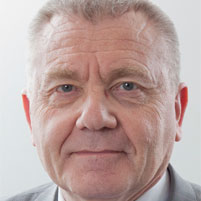
Simon Initiative Distinguished Lecture: Jean-Pierre Bourguignon
Simon Initiative
Mathematician Jean-Pierre Bourguignon will deliver the 2017 Carnegie Mellon University Simon Initiative Distinguished Lecture on Tuesday, April 18 at 4:30 p.m. in the Cohon University Center’s Rangos 3. Bourguignon, president of the European Research Council, will discuss "Scientists, Power and the Power of Scientists."
March 28, 2017
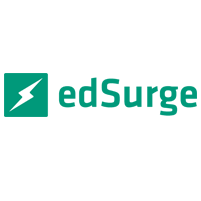
Living, Breathing and Eating Math: An Interview with Carnegie Learning's Barry Malkin
Ed Surge
Founded 20 years ago in the research labs of Carnegie Mellon University, Carnegie Learning provides software and services for 1:1 and blended math learning environments.
March 23, 2017

AI Teaching Assistant Could Shape the Future of Education
Business Insider
"AI is going to have to get smarter in terms of learning from the students when it's doing something that doesn't make sense,” said CMU’s Amy Ogan. Otherwise, AI is no better than those frustrating phone trees you get when you call the cable company. Ogan also said that there are ways to detect what the students respond to, using cameras and software to detect facial expressions, but it's very much a work in progress.
March 10, 2017

CMU Heads to South by Southwest
Carnegie Mellon University
Students from the Master of Educational Technology and Applied Learning Science (METALS) Program attended SXSWedu earlier to inform members of the educational technology community about CMU's Simon Initiative.
March 6, 2017
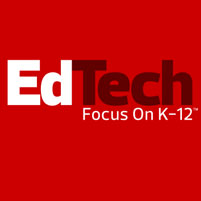
Collaboration and Discussion Tools Help Make Online Courses More Social
EdTech
California community colleges are taking part in a chatbot tool pilot aimed at getting students to interact and help each other with coursework. The collaborative tool was developed by researchers at Carnegie Mellon University.
February 8, 2017
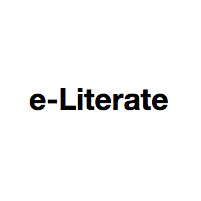
Understanding Learning Science and Its Value to Educators
e-Literate
Education should be thought of as a discipline and at least partly an applied science. Strides toward improving higher education will be limited until academics (and the people who design their compensation packages) embrace the idea of the empirical educator as core to the mission of academia.
January 26, 2017
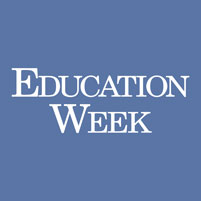
DeVos-Associated Company Alleges Brain-Training Autism "Fix'
EducationWeek
President Donald Trump's nominee to head the federal Education Department is a major backer of a company claiming its neurofeedback technology can "fix" problems such as attention-deficit hyperactivity disorder and has "proven and long-lasting" positive effects on children with autism. CMU’s Ken Koedinger weighed in on the implications for science.
January 23, 2017
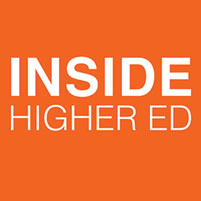
Beyond Teaching by Instinct
Inside Higher Ed
"Learning science" is becoming a buzzword, but it means experimenting with new approaches and learning from what doesn't work as well as what does, writes Michael Feldstein. And everyone who teaches for a living must do it. Feldstein shares what he learned from CMU Simon Initiative experts.
January 18, 2017

Fourth industrial revolution on full display at the WEF
Daily News & Analysis
As technology is creating new possibilities for society, industry and government, WEF is helping create interactions that reduce fear may have rapid change. CMU's Justine Cassell's work is profiled.
January 16, 2017

Is AI Sexist?
Foreign Policy
For the last two decades, Justine Cassell has been working on robot models that she hopes will be integrated into society — robots, she says, that will exist in the image of the good, virtuous people many of us want to be.
January 10, 2017
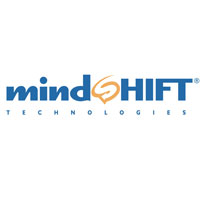
What Kids Can Learn When Blocks Get A Tech Boost
KQED MindShift
CMU’s Nesra Yannier decided to invent a new kind of educational machine with which kids could learn together. Hers would use a real table with real blocks — and a computer at the heart of it that uses motion sensors to “see” what students are doing.
January 9, 2017
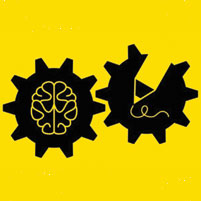
When Personalized Learning Is a Logical Fallacy
EdSurge
Personalized learning is not a product you can buy — it’s a set of strategies that teachers can implement, sometimes with the help of products that are designed to support those strategies. To explore this more, Michael Feldstein talks to CMU’s Ken Koedinger and Marsha Lovett.
January 9, 2017
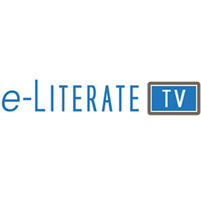
CMU Learning Scientists Featured on e-literate TV
e-literate TV
Three Carnegie Mellon University learning scientists, Marsha Lovett, Ken Koedinger and Lauren Herckis, have been featured on e-literate TV, which is designed to provoke conversations about how technology can be employed in the service of education.
January 7, 2017
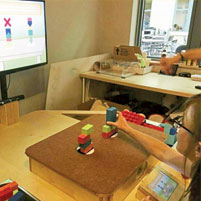
CMU Postdoc's Play Table for Children Balances Virtual, Physical Worlds
EdSurge
Students use a prototype of Nesra Yannier’s “mixed reality” teaching machine in a laboratory of Carnegie Mellon University. The research is part of a partnership between CMU and Forest Grove Elementary School to see if high-tech ideas can improve teaching and learning
